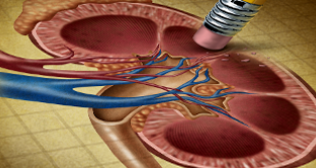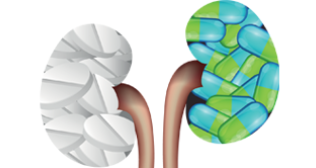
Kidney Biopsy Tests: Procedures, Risks & Results
A biopsy is a diagnostic test in which a doctor extracts a small piece of tissue from a specific body area to test for the presence or extent of a disease. When such a tissue is extracted from kidney, it is called kidney or renal biopsy. This test helps your doctor in identifying the type of kidney disease you may have, its severity, and defining a suitable treatment plan for it. Here’s all you need to know about the renal biopsy.
Types of Renal Biopsy
-
Percutaneous Biopsy (Renal Needle Biopsy): It is a process in which a thin needle is inserted through the skin by your doctor. An ultrasound or computerized tomography (CT) scan guides the doctor to the exact location from where the kidney tissue needs to be extracted. It is the most frequently used technique.
-
Open Biopsy (Surgical Biopsy): This procedure is used when a larger kidney tissue is required. The patient is given anesthesia post which the doctor makes a small surgical incision in the skin near the kidneys. He then locates a suitable area in the kidney and removes a piece of kidney tissue and stitches the incision with sutures.
Need for a Renal Biopsy
Your doctor might order a kidney biopsy if you have one or more of the following:
- A kidney problem that can’t otherwise be identified
- An unexplained drop in kidney function
- The constant presence of blood in the urine
- Presence of protein found in the urine
- Monitor a transplanted kidney
The decision of undergoing biopsy is based on patients’ signs, symptoms, test results, and overall health. It will not be needed for every patient suffering from the above.
Procedure for Renal Biopsy
Renal biopsy is commonly conducted using the following 2 techniques
Percutaneous Biopsy
It is the most frequently used procedure done through an incision to the skin. The steps of the biopsy are as follows: An anesthesia is given to the patient post which he lies on his stomach. If he has a transplanted kidney, he lies on his back. The doctor defines the right skin spot at which the biopsy needle is inserted. He cleans the skin area and administers anesthesia in that particular area near the kidney. Using ultrasound or CT images the doctor makes a small tiny incision in the skin at a proper location. The patient will be asked to hold a deep breath as the needle goes into the kidney. Several deep breaths help the doctor know that the needle has reached the exact position. Insertion will be done more than once if more than one tissue sample is required. Once the needle is removed, the pressure is applied at the site to stop any occurrence of bleeding and the biopsy site is closed using a bandage.
Open Biopsy
It is conducted when a larger tissue sample of the kidney is required for analysis. It is a surgical procedure performed under anesthesia to make it pain-free for the patient. It is performed like the way described above. However, it will require the patient to stay at least 12 hours in the hospital. He will receive medicines and fluids through mouth or IV. The patient’s urine is checked for heavy bleeding. A small amount of bleeding is not an abnormal site after an open biopsy. The patient should avoid lifting any weight heavier than 4.5kg for at least 2 weeks after the biopsy.
Risks Associated with Renal Biopsy
Seek immediate medical attention if you find one or more of the symptoms.
- Presence of blood or blood clots in urine found longer than a day after your biopsy
- Unable to urinate
- Frequent or urgent need to urinate
- Burning sensation when urinating
- Have chills or a fever
- Worsening pain at the biopsy site
- Blood or pus oozing out of the biopsy site that saturates the bandage
- Feel faint, dizzy or weak
Renal biopsy can sometimes come with a risk of causing an internal damage to the targeted organ or nearby areas.
Renal Biopsy Results
Biopsy reports are generally ready within a week’s time. In case of emergency, a partial report can be requested that can be arranged in less than a day’s time.
Normal Results
The report shows the normal structure of the kidney tissue.
Abnormal Results
An abnormal report shows changes in the kidney tissue that may be due to:
- Infection
- Poor blood flow through the kidney
- Connective tissue diseases
- Other diseases that may be affecting the kidney, such as diabetes
- Kidney transplant rejection, if you had a transplant
Your doctor may decide to order additional tests to help make a treatment plan for your kidney health. You and your doctor will discuss the results of the reports in depth and together arrive at the next steps post your renal biopsy.



















